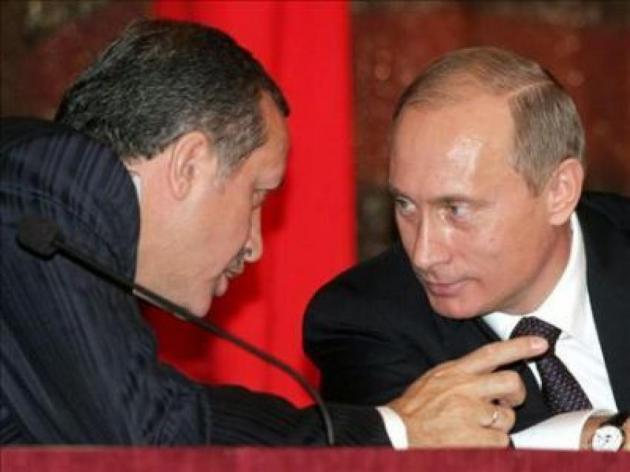By New Eastern Europe
Relations between Russia and Turkey have been rapidly deteriorating since Turkey’s downing of a Russian warplane in November 2015. But it is not only the Russian jet that makes these relations particularly difficult: a set of other contradictory interests makes the war in Syria another bone of contention between the two countries.
One thing is certain – the time for jokes are over. Could these tensions eventually lead to an open Russian-Turkish military conflict? New Eastern Europe asked a selection of experts to address this issue:

ADAM BALCER, a senior fellow at demosEUROPA Centre for European Strategy:
One cannot exclude such scenario, unfortunately. It is now more possible than it was several months ago, but it is still not a high possibility. Why cannot we exclude a war between Turkey and Russia? A military confrontation in north-western Syria is currently being waged on a small area where it is easy to cause an incident, such as shooting down a Russian jet which violated Turkey’s air space by the Turkish air force, which could cause a “domino effect” and lead to a serious escalation.
While a large-scale, conventional war between Turkey and Russia, even if the current situation escalates, is an unlikely scenario; what is possible is a confrontation on a local level. For both Turkey and Russia the situation in northern Syria is of strategic importance. They have radically contradictory interests in the area. It is extremely difficult to overcome this difference in such circumstances. Russia wants Bashar al-Assad to succeed as much as he can on the battlefield, taking the advantage of the passiveness of the West and insufficient determination of local actors like Turkey or Saudi Arabia. Together with Iran, Russia is more willing to support its Middle Eastern protégé. It is also a proxy war which Russia uses to show the world – the West and the US in particular – that it should be treated as a fully-fledged global super power. However, Russia does not have the proper cards to play such a game. The only card it has, is its military one. It is Russia’s first military intervention outside the post-Soviet area since the Soviet invasion of Afghanistan. The Kremlin plays this game also for domestic purposes. The Russian economy is in poor shape so are its perspectives for the future. A war serves here as a great replacement – it boosts nationalist moods and confirm Putin’s macho image.
For both Turkey and Russia the situation in northern Syria is of strategic importance.
The Middle East is the least stable region in the world, an area where geopolitical interests meet. Russia’s actions create or inflame the existing problems and then tries to manage them, like a pyromaniac-firefighter. It is no coincidence that Russia has military bases in Syria. It is the only Russian military base outside the post-Soviet area that was not dismantled after 1991. This fact allows Russia to pressure Turkey, Israel and NATO (British military base is located on Cyprus). Russia counts on concessions in the theatre that is most important for it – in states that were once a part of the Soviet Union.
On the other hand, there is a Turkish perspective. For Turkey, the situation in Syria is more important than it is for Russia. Turkey is in a state of geopolitical rivalry with Iran, however to a lesser extent than Saudi Arabia as Teheran is Assad’s key protector. Turkey supports the Syrian opposition which is right beyond its border. If one would look at the ethnic makeup of the region, there are visible links between the people in Turkey and Syria who live near the border. Turkey’s defeat and Russia’s victory in the area would help Assad destroy this opposition. It would be a huge blow to Turkish ambition to become a regional power. It would also mean the destruction of a buffer zone that separates Turkey from what is happening deeper in Syria.
Turkey’s Achilles’ heel is the Kurdish issue. Right now there is a war in Turkey between Ankara and the PKK (the Kurdistan Workers’ Party). In Syria, the YPG (People’s Defence Units, which is the PKK’s equivalent) significantly strengthened its position and has established a de-facto state called Rojava. Rojava has a strong position as it has maintained good relations with both Russia and the US. In this part of the world, it is an extremely rare case.
After the downing of a Russian jet by the Turkish air force in November 2015, relations between Ankara and Moscow deteriorated to the point that Russia may now try to do everything it can to humiliate Turkey or to provoke it. For Russia to play the Kurdish card is yet another opportunity. It hits Turkey directly, but also may easily spark tensions between Turkey and the US. For the US, the Kurds are key allies in the fight against ISIS (the Islamic State, or Daesh).
If the situation escalates as a result of an armed incident, Russia will try to convince the US and NATO that Turkey is responsible. In fact, Russia may not need Estonia or Latvia or other small states to show that NATO is a fictional alliance. This could be accomplished with a big state like Turkey. This would be perfect for Russia as it may kill a few birds with just one stone. You may also target the EU or Germany by causing another wave of migration or provoke tensions between Turkey and the EU and instability within the EU.
If the situation escalates as a result of an armed incident, Russia will try to convince the US and NATO that Turkey is responsible.
All these things are happening while the US is ruled by a president who is a lame duck. Barack Obama’s cautious policy towards Russia only encourages the Kremlin to play tough in the region.

ŁUKASZ FYDEREK, an associate professor at the Institute of Middle and Far East Studies at the Jagiellonian University:
Turkish policy towards the Syrian conflict proved to be ineffective. Today the Turkish elite seems to be cornered and left with a number of bad options, some of which may lead to an all-out war with Russia. It may be noted that the general inefficiency of Turkey’s policy towards Syria stems from the incoherent structure of its political goals. Turkey has been simultaneously trying to support the anti-Assad opposition and to hinder the Kurdish quest for statehood. For four years Turkey has been unable to prioritise its political agenda hoping that a regime change in Damascus will eventually bring a solution to the Kurdish question.
Turkish policy towards the Syrian conflict proved to be ineffective.
The Russian army deployment in Syria in September 2015 has ruined Turkey’s calculations. After four months of fighting, Syrian- and Iranian-commanded troops supported by massive Russian airpower, have finally gotten the upper hand in the Aleppo and Lattakia provinces, crushing Turkish-sponsored rebels in northern Syria. That military developments have left Ankara under a double threat of losing its leverage over the Syrian opposition and faced with a de-facto independent, potentially hostile, PKK-affiliated Syrian Kurdistan over its southern border.
Today, acting under a double threat, Turkey is close to a military intervention in Syria. While there are still chances that Turkey will remain idle, choosing “strategic patience” over action, the probability of a Turkish military intrusion in the coming days is high. There are two general scenarios of such an intervention: a conventional and a hybrid one. In the conventional-warfare scenario, Turkey may enter the Azaz corridor (an Arab-populated swatch of land stretching southwards from the Turkish border down to Aleppo), creating a “safe zone” under a humanitarian pretext, and trying to avoid direct confrontation with Russian forces. But even such a limited incursion may give Russian and Syrian air power the opportunity to attack Turks, using the excuse of defending Syrian sovereignty. That may bring a full-fledged escalation, in which Turks may tactically prevail over Russians, by hitting their base in Hmeimim. To deter this, the Russians will probably choose to escalate the situation by mounting an aerial attack on Turkish territory – a prelude to an open confrontation between NATO and Russia.
Turkey is close to a military intervention in Syria.
In the second scenario, the hybrid-warfare scenario, the Turks may use a variety of Sunni-Arab and Turkoman proxy groups (possibly supplemented with some Turkish regular forces operating under disguise) to entrench the Azaz corridor, effectively denying access both to YPG/SDF and regime forces. These proxy tactics will be combined with artillery support (as we currently see) and may also involve a limited use of air power with planes operating over Turkish territory using. In such a scenario, Turkey may preserve a degree of deniability over its responsibility for the incursion which should be instrumental in limiting a Turkey-Russia war.
While the second scenario seems the most probable, it does not necessarily guarantee a peaceful co-existence between Turkey and Russia. A possible Turkish hybrid war in Syria leaves plenty of room for armed incidents between Turkish and Russian armed forces. Moreover, Turkey’s co-operation with Saudi Arabia offers Ankara a number of other military possibilities for entering Syria.

GUSTAV GRESSEL, Visiting Fellow at the ECFR Berlin Office:
Turkish-Russian relations took a turn for the worse in the last week. Ankara blames the Syrian-Kurdish YPG for a series of terrorist attacks across Turkey, which are to some extent supported by Russia. Russian shelling of Turkmen-rebel positions steered up anger in Turkey. The last Russian air campaign created the ground for further Kurdish advantages and did not make the matter easier. Turkey has conducted a military campaign against the radical-left PKK in the south and the Turkish army has moved into positions along the Syrian border. In Moscow the fear that Turkey might intervene in the conflict is strong. Theoretically, Turkey would be in the position to field much stronger forces into Syria than Russia, removing the Russian presence by force. The snap-mobilisation of the Southern military district on February 4th and consecutive exercises served as a signal to deter Ankara.
In Moscow the fear that Turkey might intervene in the conflict is strong.
Russia is a source of frustration for Turkish policy for the time being. Erdoğan thought that he had forged a personal friendship with Putin based on both states’ perception as old historic centres of world politics, ought to have a sphere of influence on their own by the virtue of their countries’ history, cultural heritage, economic power and independence from the West. Both leaders shape domestic policies in similar ways, although the de-institutionalisation of the Russian state and the reduction of the decision-making-process to presidential preferences are more extensively a Russian feature. Erdoğan thought that together with Russia, it could govern the Black Sea region as Russian-Turkish condominium and while Russia deserved a free hand in the post-Soviet space, Turkey thought it had a free-hand in the post-Ottoman space. The annexation of Crimea was the first major challenge to this vision. Despite the repressions of the Crimean Tartars, which was not well received by Erdoğan’s conservative-Islamic electorate, Erdoğan tried to maintain good relations with Putin by not implementing sanctions and engaging in energy projects.
The Syria-intervention ruined the already strained relationship. Not only was it a violation of Erdoğan’s “sphere of influence (for Turkey, Syria is a similar affair as Ukraine for Russia), not consulting Erdoğan on the matter (he was in Moscow on September 23rd when the preparation for the operation in Syria was already in full swing) showed that Russia did not regard Turkey as a real great power. That was a personal insult to Erdoğan just as much as the downing of a Su-24 by Turkey was perceived as a personal insult to Putin.
But will personal insults make Turkey intervene? Erdoğan’s feelings aside, there are several reasons that suggest a “no”. First, with a resurgent and militarily active Russia on the northern shore of the Black Sea, Turkey needs good relations with Washington more than ever. Turkish-American relations have been strained to a certain extend by Turkey’s war on the Kurds, putting the US in a difficult position with one of its allies at war with another de-facto ally of Washington. Obama has no appetite of entering either the Syrian war on Turkish terms or a broader NATO-Russia confrontation for Syria. Alone, Turkey may be concerned about Russian counter-reaction against Turkey proper. So there are limitations in this regards.
Obama has no appetite of entering either the Syrian war on Turkish terms or a broader NATO-Russia confrontation for Syria.
Secondly, Turkey for the moment is not in need of a direct intervention. Such a move would make Turkey a co-owner of the conflict; responsible not only for its resolution, but also for safeguarding any possible ceasefire-agreement. It would pitch Turkey’s forces directly against Russians, hence prompting diplomatic intervention from the West (in order to prevent further escalation) which would by all likelihood mean freezing the conflict on terms favourable to Russia. If Ankara wants to teach Moscow a lesson, this would not serve its interest.
But as the war has raged for almost five years now, Ankara is in a unique position of drawing an unconventional card. It is well connected to several ethnic minorities in the north, there are enough Syrians in Turkey to be recruited and trained for guerrilla warfare and Turkey enjoys geographical proximity. If Turkey does not formally intervene, it still can claim plausible deniability and can hardly be made responsible for whatever happens on the ground. It would to a certain extend preserve independence from policy-decisions in Washington. Ankara could try to slowly erode all kinds of settlements and arrangements that Russia seeks for Syria, increasing the costs for a Russian military presence. A slowly and costly erosion of the Russian military presence in the Middle East would make Moscow more careful in engaging in such kinds of wars next time and hence reinforce Turkey’s own aspiration for regional pre-eminence.
For Europe, any likely scenario is a bad outcome. If the clandestine intervention takes place, Syria would be destabilised for the years to come and refugees would turn to Europe in larger numbers. If Turkey leaves the Russian moves unchallenged, Russian appetite to further escalate the war in Syria and dictate its terms would probably grow, leading to the same result for Europe.

SELIM KORU, analyst at the Economic Policy Research Foundation of Turkey (TEPAV):
The answer as to whether there will be war with Russia and Turkey is almost certainly no. The two countries are vastly different. Russia has nuclear weapons, one of the most powerful militaries in the world and a first-class intelligence service. Turkey is a middle power and with its mediocre conventional military capabilities is no match for the former superpower. But Turkey is a NATO ally, meaning that a Russian attack against it would be an attack against the United States and most of Europe. An open confrontation between these two countries could therefore trigger a thermonuclear war. The deterrence mechanism that prevented this from happening during the Cold War is still intact and will almost certainly prevent war between Russia and Turkey.
The unlikeliness of an all-out war however does not mean that the two countries are at peace. Turkey and Russia currently confront each other in a third country and in a context in which Turkey’s NATO membership counts very little. The Syrian Civil War has drawn in various actors and though their lines are shifting, these roughly include Turkey and the Gulf monarchies on the side of the rebels, Iran and Russia on the side of the Assad regime, the United States and some European countries on the side of the Kurdish YPG, and some groups like ISIS and Jabhat al-Nusra with mostly non-governmental aid.
Among these groups, some of the fiercest fighting has been between Turkey-backed rebels and Russian-backed regime forces. The US-backed YPG is increasingly co-ordinating with the regime as well. Turkey is therefore in the precarious position of opposing Russian and western proxies at the same time.
Turkey is doing this because it believes that an established YPG presence on its southern border would provide a forward base for the PKK. Russia’s interest lie with the Assad regime which has given it a military base in the port of Latakia, as well as the opportunity to chagrin the White House. Obama at first pushed for regime change in Syria, but relented in light of Russian and Iranian support for Damascus. The Kremlin appears pleased with this outcome and is unlikely to release pressure.
Russia and Turkey are facing off over their proxies in Syria with Turkey being unable to rely on the United States, its traditional ally.
Russia and Turkey are therefore facing off over their proxies in Syria with Turkey being unable to rely on the United States, its traditional ally. Turkey has already played into Russia’s hand by shooting down one of its jets and is now unable to enter Syrian airspace for fear of Russian-deployed S-400 anti-aircraft systems. If Ankara makes good on its threats and invades Syria with ground forces to stop PYG advancements, it should at the least be counting on Russian bombardment. NATO would be unlikely to come to Turkey’s aid if this should happen, making it a golden opportunity for Russia to further widen the wedge it has driven into the alliance.
The Turkish leadership has not entered Syria when the risks were considerably lower than they are today. Hence, they are unlikely to do so now.

ALEXEY MALASHENKO, chair of the Carnegie Moscow Center’s Religion, Society and Security Programme:
The question as to whether a war between Russia and Turkey is possible does not seem serious as it is rather silly. This question, which may be regarded as a provocation, is exploited by propaganda. In Russia it aids in the further militarisation of the society, the rise of xenophobia and an increase in aggression. On Russia TV, the issue of military conflict between Russia and Turkey is discussed seriously. But a war between Russia and Turkey is impossible. First, neither Russia nor Turkey need such war. There would be no winner despite the fact that Russia’s military might is incomparably higher than that of Turkey. Russia is simply not in a position to make full use of it. A war requires certain operations. In order to wage such a war, Russia would have to send its military units to the Middle East. The Kremlin simply would not agree to this course of action.
Secondly, such a war could in theory develop into a direct military confrontation between Russia and NATO; and NATO states – neither the United States nor the European states – need that. NATO members certainly would not rush to defend Turkey. And Turkey will certainly not be a reason for a “Third World War”. Third, even though NATO strongly criticises the Kremlin for its aggressive foreign policy, it will not allow Recep Tayyip Erdoğan to cross this “red line”. Moscow understands this perfectly well, so it can endlessly frighten Turkey without taking any serious military action against it. Fourth, a war with Turkey would put an end to Russia’s presence in the Middle East, which Russia has been struggling to establish over the last five years. In that case it would be reckless to engage on the side of Bashar al-Assad in Syria.
A war between Russia and Turkey is impossible. Neither Russia nor Turkey need such war.
A military conflict with Russia would not be in the interest of Turkey, either. It would not increase Erdoğan’s popularity. Nor would it end with a victory for Turkey, but instead it would worsen the domestic situation in the country and will not make it easier, in any way, to resolve the Kurdish issue. After all, a war with Russia would weaken Turkey’s position in the region. There will be no war between Russia and Turkey. This is certain. However, playing the “war card” may be useful for some politicians and for propaganda purposes on both sides, so it the rhetoric might continue for some time. Both Vladimir Putin and Erdoğan, each in their own way, are positioning their countries as great powers. Both of them need an external enemy in order to consolidate societies around them. So far, Putin is succeeding in that.



















